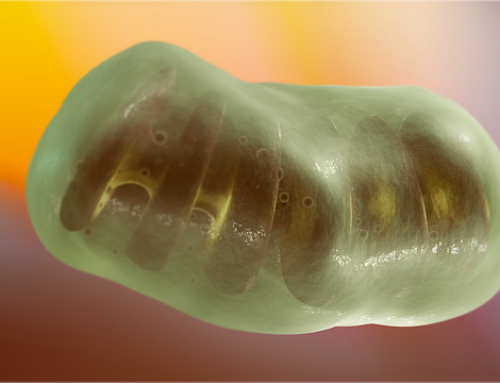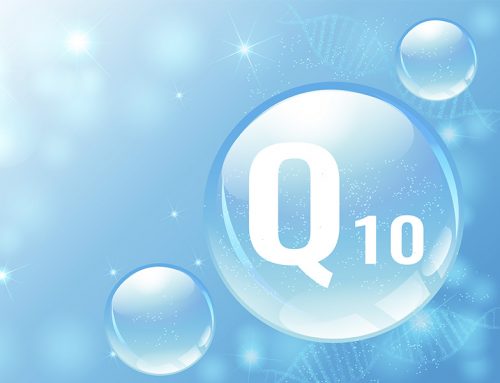Interesting statistics regarding life expectancy and longevity in the United States:
- Individuals with no chronic conditions by age 67 years can expect to live another 22.6 years on average.
- Individuals aged 67 years with 5 chronic conditions can expect to live 7.7 fewer additional years, on average.
- Individuals aged 67 years with 10 or more chronic conditions can expect to live 17.6 fewer additional years, on average.

Our cells’ production of Coenzyme Q10 declines as we get older and older. We need adequate Coenzyme Q10 in our cells to produce ATP energy, to protect against harmful free radicals, and to modulate inflammation.
These are some of the outcomes of a retrospective cohort study done by researchers at the Johns Hopkins University Bloomberg School of Public Health using the data from 1,372,272 Medicare fee-for-service beneficiaries who were 67 and older [DuGoff 2014].
When the researchers talk about chronic conditions (also called co-morbidities), they are referring to such conditions as cancer, cardiovascular disease, diabetes, hypertension, kidney disease, liver disease, and neurodegenerative diseases, among others.
These are the conditions that reduce our chances at a long and healthy life.
Coenzyme Q10 and Degenerative Diseases and Longevity
Mantle and Hargreaves in a 2019 review article summarize the evidence for oral supplementation with Coenzyme Q10 to prevent or delay the progress of several degenerative diseases.
Chief among the degenerative diseases for which we have studies showing a beneficial effect of CoQ10 supplementation are cardiovascular disease, diabetes, kidney disease, and liver disease [Mantle & Hargreaves 2019].
Mantle and Hargreaves [2019] suggest the following mechanisms of action for the beneficial effects of the CoQ10 supplementation. Remember: the cellular bio-synthesis of Coenzyme Q10 declines with increasing age. Supplementation with a well-formulated CoQ10 product that has documented absorption and bioavailability is a must.
- essential for cellular energy generation
- important as a lipid-soluble antioxidant
- demonstrated anti-inflammatory action
- associated with improved endothelial function
Coenzyme Q10 and Cardiovascular Disease
Two high-quality randomized, double-blind, placebo-controlled clinical trials are of special interest.
The Q-Symbio Study has shown the heart health benefits of daily supplementation of chronic heart failure patients with 3 x 100 mg of Coenzyme Q10 at meal times [Mortensen 2014; Mortensen 2019].
The KiSel-10 Study has shown the heart health benefits of daily supplementation of community living elderly citizens with 2 x 100 mg of Coenzyme Q10 plus 100 mcg of selenium [Alehagen 2013; Johansson 2015; Alehagen 2018].
In both studies, the risk of mortality from cardiovascular disease was significantly reduced, heart function improved, and health-related quality of life increased.
Coenzyme Q10 and Diabetes
Mantle & Hargreaves [2019] make the following observations:
- Studies have shown depleted blood CoQ10 levels in patients with type II diabetes [Mantle 2017].
- Randomized controlled clinical trials of CoQ10 supplementation of type II diabetic patients in the range of 100–200 mg/day for 3–6 months have shown that the CoQ10 supplementation is associated with significantly improved glycemic control, improved fasting plasma glucose, improved HbA1c levels, and reduced chronic inflammation [Mantle 2017].
- One study shows that CoQ10 supplementation of patients with impaired glucose tolerance may slow the progression from pre-diabetes to type II diabetes [Mantle 2017].
Mantle & Hargreaves [2019] suggest that supplemental Coenzyme Q10 may benefit type II diabetes patients via several mechanisms:
- enhancing cellular energy levels that are required for glucose metabolism
- modulating the expression of genes relevant to glucose metabolism
- neutralizing harmful free radicals
- reducing chronic inflammation
- improving endothelial function
Coenzyme Q10 and Hypertension
A meta-analysis of the data from 17 randomized controlled trials that enrolled 684 metabolic diseases patients has shown that CoQ10 supplementation is associated with significantly decreased systolic blood pressure [Tabrizi 2018].
A meta-analysis of 12 clinical trials that enrolled 362 hypertensive patients has shown that CoQ10 supplementation can lower systolic blood pressure by up to 17 mm Hg and diastolic blood pressure by up to 10 mm Hg without significant side effects [Rosenfeldt 2007].
Coenzyme Q10 and Chronic Kidney Disease
Mantle & Hargreaves [2019] note that patients with chronic kidney disease are at a 10 to 20 times higher risk of developing cardiovascular disease. They summarize the evidence for CoQ10 supplementation as follows:
- Significantly lower plasma CoQ10 levels have been reported in chronic kidney disease patients with and without hemodialysis.
- In patients with chronic kidney disease, CoQ10 supplementation may improve renal function and may reduce the need for dialysis.
- CoQ10 supplementation significantly improves outcomes in hemodialysis patients by reducing markers of oxidative stress and inflammation.
- Daily supplementation of elderly Swedish citizens with Coenzyme Q10 and selenium resulted in significantly improved renal function as seen in creatinine and cystatin-C levels [Alehagen 2020].
Coenzyme Q10 and Liver Disease
The liver is the major site of CoQ10 bio-synthesis. Thus, decreased liver bio-synthesis of Coenzyme Q10, whether as a consequence of ageing or of metabolic changes in liver function, can increase the risk of heart disease as the heart muscle cells need adequate Coenzyme Q10 for energy generation and for antioxidant protection [Mantle & Hargreaves 2019].
In fact, non-alcoholic fatty liver disease is a risk factor for cardiovascular disease. Heart disease is one of the major causes of death in non-alcoholic fatty liver disease patients. Non-alcoholic fatty liver disease has been associated with the arrhythmia, atherosclerosis, heart failure, and valve dysfunction [Mantle & Hargreaves 2019].
Mantle & Hargreaves [2019] warn that the decline in CoQ10 levels associated with liver disease may be a problem in liver disease patients who have been prescribed statin medication because the statins inhibit not only the bio-synthesis of cholesterol but also the bio-synthesis of Coenzyme Q10.
Summary: Coenzyme Q10 and Longevity and Life Expectancy
Oral supplementation with Coenzyme Q10 is safe and well-tolerated.
CoQ10 products are affordable: however, it would be a mistake to choose an inexpensive CoQ10 product that has no documentation of its absorption and bioavailability. A cheap product that is eliminated rather than absorbed is a waste of money.
Good CoQ10 absorption and bioavailability depend upon the formulation: the choice of the carrier oils, the proper heating and cooling procedures, and upon the solubilization of the CoQ10 crystals to single CoQ10 molecules [Lopez-Lluch 2019]. The intestinal absorption cells cannot absorb CoQ10 crystals.
It is not necessary to take a ubiquinol supplement to get enough ubiquinol into the blood. A properly formulated ubiquinone CoQ10 supplement will significantly increase the level of ubiquinol in the blood and in the lipoproteins in the blood [Mohr 1992; Mantle & Dybring 2020].
Read our key article about CoQ10 and cardiovascular health in elderly people
Sources
Alehagen U, Johansson P, Björnstedt M, Rosén A. Cardiovascular mortality and N-terminal-proBNP reduced after combined selenium and coenzyme Q10 supplementation: A 5-year prospective randomized double-blind placebo-controlled trial. Int J Cardiol. 2013;167:1860-1866.
Alehagen U, Aaseth J, Alexander J, Johansson P. Still reduced cardiovascular mortality 12 years after supplementation with selenium and coenzyme Q10 for four years: A validation of previous 10-year follow-up results of a prospective randomized controlled trial. PLoS One. 2018;13:e0193120.
Alehagen U, Aaseth J, Alexander J, Brismar K, Larsson A. Selenium and Coenzyme Q10 Supplementation Improves Renal Function in Elderly Deficient in Selenium: Observational Results and Results from a Subgroup Analysis of a Prospective Randomised Double-Blind Placebo-Controlled Trial. Nutrients. 2020 Dec 9;12(12):3780.
DuGoff EH, Canudas-Romo V, Buttorff C, Leff B, Anderson GF. Multiple chronic conditions and life expectancy: a life table analysis. Med Care. 2014 Aug;52(8):688-94.
Johansson P, Dahlstrom O, Dahlstrom U, Alehagen U. Improved health-related quality of life, and more days out of hospital with supplementation with selenium and coenzyme Q10 combined. J Nutr Health Aging. 2015;19:870-7.
López-Lluch G, Del Pozo-Cruz J, Sánchez-Cuesta A, Cortés-Rodríguez AB, Navas P. Bioavailability of coenzyme Q10 supplements depends on carrier lipids and solubilization. Nutrition. 2019 Jan;57:133-140.
Mantle, D. CoQ10 supplementation for diabetes and its complications: An overview. Br. J. Diabetes. 2017;17:1–4.
Mantle D, Hargreaves I. Coenzyme Q10 and degenerative disorders affecting longevity: an overview. Antioxidants (Basel). 2019;8(2):44.
Mantle D, Dybring A. Bioavailability of Coenzyme Q10: An Overview of the Absorption Process and Subsequent Metabolism. Antioxidants (Basel). 2020 May 5;9(5):386.
Mohr D, Bowry VW, Stocker R. Dietary supplementation with coenzyme Q10 results in increased levels of ubiquinol-10 within circulating lipoproteins and increased resistance of human low-density lipoprotein to the initiation of lipid peroxidation. Biochim Biophys Acta. 1992 Jun 26;1126(3):247-54.
Mortensen SA, Rosenfeldt F, Kumar A, Dolliner P, Filipiak KJ, Pella D, Alehagen U, Steurer G, Littarru GP; Q-SYMBIO Study Investigators. The effect of coenzyme Q10 on morbidity and mortality in chronic heart failure: results from Q-SYMBIO: a randomized double-blind trial. JACC Heart Fail. 2014 Dec;2(6):641-9.
Mortensen AL, Rosenfeldt F, Filipiak KJ. Effect of coenzyme Q10 in Europeans with chronic heart failure: A sub-group analysis of the Q-SYMBIO randomized double-blind trial. Cardiol. J. 2019;26:147–156.
Rosenfeldt F L, Haas S J, Krum H, Hadj A, Ng K, Leong J Y, Watts G F. Coenzyme Q10 in the treatment of hypertension: a meta-analysis of the clinical trials. Journal of Human Hypertension. 2007; 21(4): 297-306.
Tabrizi R, Akbari M, Sharifi N, Lankarani KB, Moosazadeh M, Kolahdooz F, Taghizadeh M & Asemi Z. The effects of Coenzyme Q10 supplementation on blood pressures among patients with metabolic diseases: a systematic review and meta-analysis of randomized controlled trials. High Blood Press Cardiovasc Prev. 2018 Mar;25(1): 41-50.
The information presented in this review article is not intended as medical advice and should not be used as such.
30 January 2022.









Leave A Comment